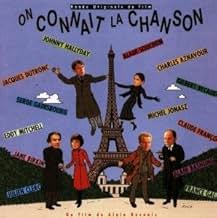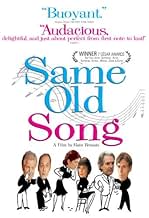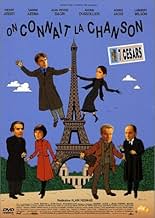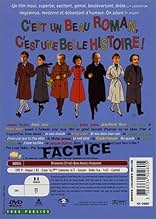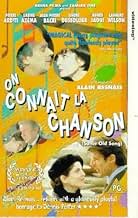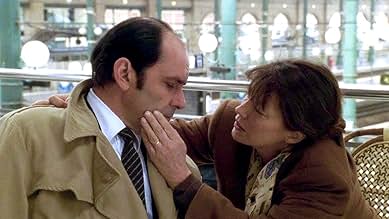IMDb-BEWERTUNG
7,3/10
4570
IHRE BEWERTUNG
Eine musikalische Geschichte über die Suche nach Liebe in den Straßen von Paris.Eine musikalische Geschichte über die Suche nach Liebe in den Straßen von Paris.Eine musikalische Geschichte über die Suche nach Liebe in den Straßen von Paris.
- Regie
- Drehbuch
- Hauptbesetzung
- Auszeichnungen
- 10 Gewinne & 9 Nominierungen insgesamt
Empfohlene Bewertungen
Alain Resnais was at the age of 76 when he made his first musical, and to be honest he might just be the last filmmaker I would've guessed to make a musical - even that music has always played a huge part in his films. Alain Resnais was one of the most essential auteurs of the French new wave in early 1960's, during which he got a reputation as an experimental filmmaker by making Hiroshima mon amour (1959) and Last Year at Marienbad (1961) - who would've thought that a man who made these tragic, ambiguous films was going to make a musical? To my mind, through Same Old Song (1997) Resnais achieved the same Hitchcock did; combining experimentalism and populism - the film was drowned by Cesar awards.
In my opinion Same Old Song is the best musical made after the 1960's. Just like western and film-noir so has this genre died. But luckily someone was still able to bring something new to it. Same Old Song is and is not a musical. In the genre wishful thinking, better and dreamed ego, hopes for a better world and existence are combined. From this perspective Same Old Song is a musical but this idyllic joy is destroyed by showing the actual agony and depression that possess the characters. In the film the characters sing in appropriate and inappropriate situations; the music comes from a tape and it doesn't necessarily fit into the mouth of the singer. A young lady can sing throaty and loudly, and a German officer can burst out to a falsetto.
In the beginning there is a Resnaisian leap of time: 50 years, from WWII to the lives of the regardless and ignorant bourgeoisie of today. The reality is very elusive, nothing and no one is what they first seem to be: the inappropriate songs. The characters aren't living in harmony with each other nor with themselves, what the idyllic songs seem to reinforce - it's all a lie, fake, window dressing.
The characters sing classics by Edith Piaf, Serge Gainsbourg and Charles Trenet - same old songs. "No one in our world can sing songs throughly anymore." (Alain Resnais) So all the songs are association; we only here brief fragments from them and this idea works brilliantly. The songs/ideas remain undone and the characters don't empathize. An old Avantgardist goes deeper into the core of art, not by adding but by erasing and simplifying.
Same Old Song could be seen as a parody or a travesty of musicals as the artificial joy wins. But it also has a social dimension; depicting the illusion of bourgeois happiness. The ostensible joy of the same old songs hides the depression, tiredness and panic disorders: "How long does depression last?, - 'Mine has lasted for four years.'" The things of everyday life, falling in love, decent life bury the actual fears of reality. The characters eat a lot and go to cocktail-parties, they don't really know who they are. The postmodern architecture represents the rootlessness of the characters and the vacancy of their lives - Alain Resnais continued from here in his later film Coeurs (2006), which is the best romantic comedy made in decades.
An obscure agony characterizes the city the characters live in. The singing society and artificial happiness are like a horror-utopia - to which not even some of the finest science fictions can't be compared to. Some of the characters realize their agony, share it and move on. But the others continue their artificial idyllic life - singing with no worries.
In my opinion Same Old Song is the best musical made after the 1960's. Just like western and film-noir so has this genre died. But luckily someone was still able to bring something new to it. Same Old Song is and is not a musical. In the genre wishful thinking, better and dreamed ego, hopes for a better world and existence are combined. From this perspective Same Old Song is a musical but this idyllic joy is destroyed by showing the actual agony and depression that possess the characters. In the film the characters sing in appropriate and inappropriate situations; the music comes from a tape and it doesn't necessarily fit into the mouth of the singer. A young lady can sing throaty and loudly, and a German officer can burst out to a falsetto.
In the beginning there is a Resnaisian leap of time: 50 years, from WWII to the lives of the regardless and ignorant bourgeoisie of today. The reality is very elusive, nothing and no one is what they first seem to be: the inappropriate songs. The characters aren't living in harmony with each other nor with themselves, what the idyllic songs seem to reinforce - it's all a lie, fake, window dressing.
The characters sing classics by Edith Piaf, Serge Gainsbourg and Charles Trenet - same old songs. "No one in our world can sing songs throughly anymore." (Alain Resnais) So all the songs are association; we only here brief fragments from them and this idea works brilliantly. The songs/ideas remain undone and the characters don't empathize. An old Avantgardist goes deeper into the core of art, not by adding but by erasing and simplifying.
Same Old Song could be seen as a parody or a travesty of musicals as the artificial joy wins. But it also has a social dimension; depicting the illusion of bourgeois happiness. The ostensible joy of the same old songs hides the depression, tiredness and panic disorders: "How long does depression last?, - 'Mine has lasted for four years.'" The things of everyday life, falling in love, decent life bury the actual fears of reality. The characters eat a lot and go to cocktail-parties, they don't really know who they are. The postmodern architecture represents the rootlessness of the characters and the vacancy of their lives - Alain Resnais continued from here in his later film Coeurs (2006), which is the best romantic comedy made in decades.
An obscure agony characterizes the city the characters live in. The singing society and artificial happiness are like a horror-utopia - to which not even some of the finest science fictions can't be compared to. Some of the characters realize their agony, share it and move on. But the others continue their artificial idyllic life - singing with no worries.
6gans
The sing-along idea is clever and well-implemented, but the story goes around in circles and above all the film is too static to support the musical premise. It's sad to see such lackluster direction from the creator of _Hiroshima mon amour_. If you like Jaoui and Bacri, go see _Le gout des autres_!
In the unapproximate center of "On connaît la chanson," find a marvelous joke that missed by everyone at the sold out SFIFF screening I attended. If you want to try to catch it yourself, then don't read on! I'm writing to those of you who didn't or won't catch it. Four or five characters are seated chatting or arguing, I forget, round a table in a busy restaurant. As you know from other comments here, the script incorporates line fragments from well-known French songs (kind of like those "hidden picture" puzzles in the dentist office magazine). As each occurs, someone bursts into song. One of our group, after an unremarkable, perfectly conversational pause, says "je ne regret rien," then pauses, as does everyone else round the table. They look at one another, everyone at everyone, the very clatter of the restaurant seems to pause, waiting, and for the only time in this film, nobody takes the cue. Nobody breaks into the Piaf standard.
I will always go out of my way - in December last year I tracked down a tiny theatre - capacity roughly 50 - in a Parisian alley to catch a performance of their 'Un air de famille' (yes, it was great, thanks for asking) to see anything written by Jean-Pierre Bacri and Agnes Jouai, and if they are performing as well, as they do in this movie, then that is icing on the cake. I tend to associate Resnais with pretentious intellectual 'popcorn' movies like Last Year At Marienbad and Hiroshima, Mon Amour so it makes a welcome change to discover that he can turn his hand to mainstream and deliver, with a little help from a great script and great acting from Bacri and Jouai, a great feel-good movie. The usual suspects - Andre Dussolier, Pierre Arditi, etc are on hand and turn in the usual above par performances. This is one to savor. 8/10
This film, a tribute to Dennis Potter (pennies from heaven, the singing detective), is the best french comedy I've ever seen. Basically it's a typical well-made french film about relations, with great acting, set in Paris. But it's more than that: it's also a musical. Here are some reasons why I think it's a great movie. First, the chansons, play-backed by the actors, are brilliant. Imagine a Wehrmachtofficer lipsinging to an Edith-Piaf chanson (in the opening act). The best thing about the chansons, is the fact that they actually support the story, as they serve as moments of reflection and introspection for the players. Maybe it's the contrast between the extreme sentimentality and the 'serious' acting that makes this film so great. Go see it.
Wusstest du schon
- WissenswertesThe film is dedicated to the memory of Dennis Potter, and is in the style of Potter's lip-sync musicals like Tanz in den Wolken (1978), Der singende Detektiv (1986) and Lippenstift am Kragen (1993).
- VerbindungenFeatured in 6 à la maison: Folge vom 27. Januar 2021 (2021)
- SoundtracksJ'ai Deux Amours
Music by Vincent Scotto
Lyrics by Georges Koger and Henri Varna
Performed by Josephine Baker
Top-Auswahl
Melde dich zum Bewerten an und greife auf die Watchlist für personalisierte Empfehlungen zu.
- How long is Same Old Song?Powered by Alexa
Details
- Erscheinungsdatum
- Herkunftsländer
- Offizieller Standort
- Sprachen
- Auch bekannt als
- Same Old Song
- Drehorte
- Hôtel Meurice - 228 Rue de Rivoli, Paris 1, Paris, Frankreich(opening scene: Camille tells about von Choltitz in front of the hotel)
- Produktionsfirmen
- Weitere beteiligte Unternehmen bei IMDbPro anzeigen
Box Office
- Budget
- 7.900.000 € (geschätzt)
- Laufzeit2 Stunden
- Farbe
- Sound-Mix
- Seitenverhältnis
- 1.85 : 1
Zu dieser Seite beitragen
Bearbeitung vorschlagen oder fehlenden Inhalt hinzufügen

Oberste Lücke
By what name was Das Leben ist ein Chanson (1997) officially released in India in English?
Antwort
